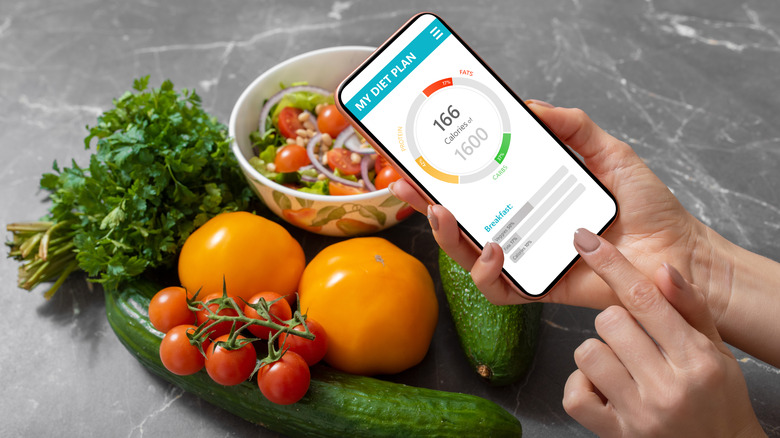Why You're Gaining Weight Even In A Calorie Deficit
Losing weight can be a true test of discipline and patience. Not only does it require you to reduce the number of calories you eat in a day, but it also requires you to wait a few weeks to get results. For most people, pulling back about 500 calories a day is an adequate calorie deficit to lose about a pound a week. If you maintain this calorie deficit, you should notice a few pounds drop off in about three or four weeks.
A few factors can stall your weight loss, however, even if you're in a calorie deficit. If you're sleep-deprived, your metabolism might slow as a result. Stress can also make the numbers on the scale a little more stubborn because your body is releasing cortisol that can hold back the fat-burning. You might believe calories in, calories out; but the type of calories you eat can have an effect on your weight loss, too. Processed meats, high-sugar foods, and alcohol won't cooperate with your weight loss efforts as well as lean meats, whole grains, and vegetables do (via HealthNews).
In some cases, you might find the numbers on the scale increasing rather than stalling or decreasing. Several factors could point to why you're gaining weight when you're in a calorie deficit, such as overeating or undereating.
How portion sizes affect weight loss
According to PEScience, food portions are much larger than in past decades. Burgers, french fries, and chocolate chip cookies can be up to seven times larger. Even the size of sandwiches that people eat for lunch has become larger, which means more calories. Moreland OB-GYN says that these larger portions can make it difficult to maintain a calorie deficit while eating out. With a larger idea of what a portion size is, you could also be making the same mistake when cooking at home. To keep your servings within your calorie deficit, measure the serving size of your foods before adding them to your plate.
On the flip side, you might be tempted to cut back even more calories a day to see more dramatic results. Although this might help you get a quick start on your diet, eating too little sends a signal to your body that it's starving. When that occurs, your metabolism slows down and holds onto the calories you consume. According to Nutrisense, consuming too few calories for a long time can also result in mood imbalances, immune dysfunction, and muscle loss (which also stalls your metabolism).
How to maintain a healthy calorie deficit
Juniper advises using an online calculator to figure out how many calories you need daily to maintain your weight, which might vary according to your age, height, and physical activity from your job or fitness program. From there, subtract 500 to see a pound of weight loss a week if you keep everything else (like your activity level) consistent. If this seems to be tough at first, MedicineNet suggests starting with a 200- or 300-calorie deficit.
It's much easier to track your food intake through food tracker apps. Healthline recommends MyFitnessPal because it has more than 11 million foods in its database to help you keep track of your daily calories. MyFitnessPal also partners with other fitness apps to automatically add your exercise and walking activity to help keep your calorie deficit in balance. It can also see what choices are best for your diet when you're eating at a restaurant. The premium version of the app allows you to scan the barcode of your foods to make tracking much easier. The Lose It! app is another food tracker that allows you to sync health apps, but the barcode scanner comes with the free version.



